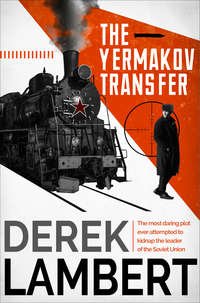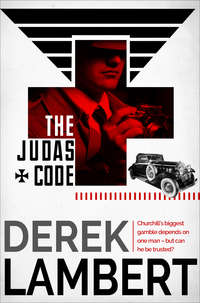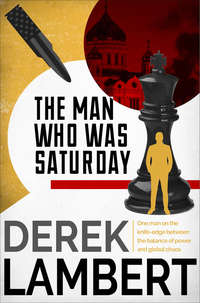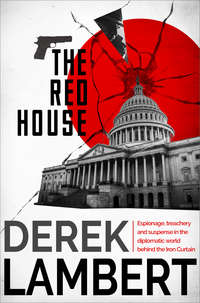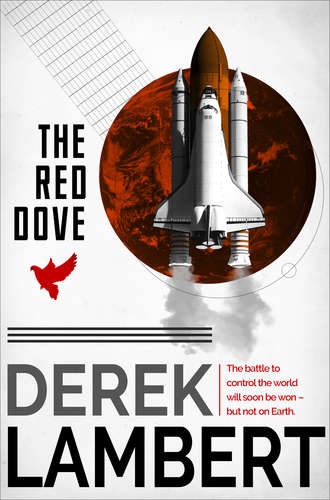
Полная версия
The Red Dove
To ensure survival, without resorting to blackmail based on KGB surveillance, he had to mastermind a sensational intelligence operation. Then and only then could he retire honourably and, perhaps, explain to his family why he had neglected them. If, that was, you could ever explain to anyone that, if you were born a schemer, your intrigues possessed you.
From one wall of the study the photographs of his three children, quick with youth but now middle-aged, reproved him. He went into the living-room where his wife was watching television, poured himself another whisky and returned to the study. It was dark now and the cars below were beads of light being pulled on invisible threads; he imagined for a moment that he could control those threads as he controlled the destinies of Russia’s people.
But it is your direction, that should concern you, Nicolay Vlasov. Sipping his whisky, listening to the ice tinkle like wind chimes, he applied his mind to what, at the moment, seemed an insuperable problem.
But he wasn’t to know that a man named Robert Massey was about to be asked to take a hand in his destiny.
CHAPTER THREE
Robert Massey said: ‘Pick it up, please.’
Startled, the young jock showing his muscles to three girls in bikinis sitting on the almost deserted beach exclaimed: ‘Huh?’
Massey pointed at the can of Tab sugar-free soft drink that the jock had just tossed on the sand. ‘I asked you to pick it up. We’re trying to keep this beach clean.’
‘Why don’t you go fuck yourself?’ The young man’s tone was mild.
I don’t even merit truculence, Massey thought; but he understood the lazy contempt; when you were eighteen, weighing around 200 lbs with an iron-pumper’s muscles, you didn’t get upset by an old man of forty-five, wearing patched jeans and a tattered black sweater, with two days’ stubble on his jaw and whisky on his breath.
Sizing up the bare-chested jock wearing cut-offs Massey said: ‘Pick it up, boy,’ and thought: ‘You’re looking for a fight again, Massey, and you’ll get beat up but you’ll hurt him a little, the old training will see to that.’
The jock kicked the can towards Massey and, winking at the girls, said: ‘Pick it up yourself, grandpa.’
Apart from the old training Massey also had another hidden weapon. Surprise. Moving quickly despite the whisky inside him, Massey hacked the jock’s legs from under him with one foot and, as he fell, hit him on the jaw with his fist.
The jock sat up spitting out sand. ‘Jesus,’ he said, ‘what kind of nut are you?’
Massey understood his dilemma; if the two of them had been alone he would have torn him apart and thrown the pieces to the sharks. But in front of three girls who might appreciate chivalry as well as muscle you didn’t beat the bejaysus out of an ageing freak.
Massey solved his problem by kicking him on the side of the face.
‘All right, asshole,’ the jock said, ‘you asked for it.’
Scrambling to his feet, he came at Massey two-fisted, but his muscles got in the way. Massey side-stepped and tripped him again. As he fell the girls giggled. Enraged, the jock got up, the desire to kill plain on his face. Massey didn’t have any surprises left. But he was still trading blows when one of the girls shouted: ‘Come on, Mr Massey, you give it him.’ He was so astonished that she knew his name and was rooting for him that he dropped his guard, enabling the jock to hit him on the neck. Even then, if it hadn’t been for the whisky, he might have recovered his balance; as it was he staggered and fell and the jock kicked him in the face and belly. He managed to get up, felt one fist flatten his nose, another land below the ribs; as he doubled up a knee caught him in the crotch.
He lay submissively in agony as the bare-footed kicks came in. He was dimly aware of female voices shrieking, of scuffling, of a phrase from the voice that had known his name: ‘Get away from him, you animal.’
When he opened his eyes he heard the waves washing the sand, smelled tanning oil, became aware that his head was being cradled against firm young breasts. He looked up into worried blue eyes.
The girl said: ‘He would have killed you, Mr Massey.’
‘You hauled him off?’ incredulously.
‘I helped. But it was Sharon mostly. She’s an El Al stewardess and, you know, they’re into karate, judo, all that stuff.’
‘Where’s Sharon now?’ He touched his split nose and winced; he didn’t move because he liked the feel of her breasts; he tried to smile but that hurt too.
‘Gone to get someone to patch you up. Jeannie went off with the animal. You know, she was kidding him along just to get rid of him.’
‘I don’t need anyone to patch me up,’ Massey told her. This time he did move a little and pain stabbed him in the groin.
‘You just stay right where you are,’ her voice maternal. And then: ‘A lot of us are worried about you, Mr Massey.’
‘How did you know my name?’
‘I knew it when I was a kid. You were one of my heroes. I even had your picture pinned up in my room.’
‘You mean you still recognise me?’
‘Well no,’ she admitted. ‘But I recognised your name when you came to live here and I did a little checking. I – we, that is – are grateful for the way you help to look after the island. The trouble is, you don’t look after yourself.’
A wind was ruffling the sea and combing the long grass in the dunes, and gulls were crying in the sky.
‘I manage,’ Massey told her.
Hesitantly, she said: ‘They say you drink a little too much.’
‘You sound like Rosa.’
‘Is that the woman you live with?’
He nodded and that hurt too. ‘What’s your name?’ he asked.
‘Jane,’ she told him. ‘Plain Jane.’
‘Not plain,’ he said, ‘beautiful,’ and began to struggle to his feet because she might think he was making a pass and it must be embarrassing enough for her as it was cradling the head of a crock who, in addition to the stubble and the whisky, sported a rapidly-closing eye and a busted nose.
‘Hey,’ she said, ‘where are you going?’
‘Home.’
‘But –’
‘And thank you,’ he said. ‘And Sharon and Jeannie.’
‘Are you sure you’ll be okay?’
He wasn’t but he said: ‘Quite sure.’
‘Is there anything I can do? Do you want me to come with you?’
He shook his head and it still hurt but not so much because his attention was diverted by the pain in his groin. It was on fire.
As he turned away she called: ‘You had him beat, Mr Massey, until I called out to you.’
One of his feet struck an object in the sand. He bent down, picked up the Tab can and handed it to her. ‘There is something you can do for me,’ he said. ‘Get rid of this.’
He smiled at her and limped off down the beach.
Robert Massey chose Padre Island because it reminded him of space. The skies were wide and deep, the beaches went on forever, the quiet enfolded you.
Padre Island is, in fact, two main islands, South and North, that form a scimitar 140 miles long off the Texas coast in the Gulf of Mexico. It consists mostly of grass and sand although the smaller South Island, only twenty-five miles long, has been developed and boasts a Hilton in Port Isabel. What is said to be the world’s largest shrimping fleet anchors here and a little further down the mainland at Brownsville.
Hearing the machine-gun fire of the constructors’ drills, Massey headed for the North Island which has its own port, Aransas, (actually on a fragment of island known as Mustang linked to the North Island by Route 53), and long, lonely stretches of land inhabited by gophers and ground squirrels below skies where herons and falcons join the gulls.
At the turn of the seventies Padre Island’s tourist industry received two publicity boosts: an army of 200 unemployed armed with shovels managed to clear the residue of a massive oil-spill from the beaches and a local girl, Gig Gangel, was featured as a Playboy centrefold. But still the lovely wastes of North Padre, where treasure hunters seeking Spanish gold are prohibited, remain untarnished, protected by Padre Island National Seashore Trust at Corpus Christi and conservationists such as Robert Massey.
Massey, with a gratuity and pension supplied by ‘a grateful Government’, patrolled the North Island protecting wild life from tourists, moving on the gold hunters with their metal detectors, clearing jetsam from the beaches, scanning the sea by helicopter for oil slicks, caring for birds and turtles crippled by the oil, taking the latter to Ila Loetscher, an old lady who cared for them on South Island.
When he was sober he was regarded by the conservation authorities as a Godsend; when drunk, which was frequently, as a pain.
As he limped towards his old green Chev to drive back to Port Aransas the wind strengthened. The grass in the dunes bent with it and the ocean was plucked with white feathers of foam; ahead of him scuttled a flock of sanderlings. The sky was still blue but it had a metallic sheen to it. Massey spotted a marsh hawk flying high. He cupped a hand to his swollen eye and stared at the hawk with his good one; but he peered far beyond the hawk, to a platform in space where, among the stars, he looked on an island far bigger than Padre. The island was the world.
He climbed into the Chev and drove along the highway to the shack on the fringe of the little port, where Rosa would be waiting for him. Once loving, still comforting, sad for him and herself, the Mexican girl, now on the plump side, from across the border in Matamoros who only reminded him that she had sacrificed her youth for him when he was very drunk.
When she heard the car she ran across their patch with its top-heavy sunflowers and bolting lettuces, the only part of Padre Island that he didn’t seem to care about. When she saw his face she put a hand to her mouth as though in pain herself, then opened her arms to him.
As they walked across the patch she said to him: ‘We have a visitor.’
‘Yeah? Who?’
‘A man called Reynolds,’ she said.
The green dossier lay on the cracked glass surface of the cane table standing between them. Reynolds tapped it with one finger and said: ‘I want to level with you; that’s why I want you to read it.’
The dossier was marked TOP SECRET and bore the coding SI 202, Massey’s name and, in the bottom right hand corner, a round coffee stain. Massey picked it up and flipped the pages, 183 of them.
‘Didn’t you always level with me?’ he asked.
‘I don’t want to discuss anything now. I want you to read that, then we’ll talk tomorrow.’
‘Why the hell would you suddenly want to level with me after all this time?’
‘Tomorrow,’ Reynolds said.
Massey poured himself whisky from a half-full bottle of J & B. Reynolds sipped an orange juice. After bathing Massey’s face Rosa had gone into town to buy groceries; the only other occupant of the shack was an old green turtle crippled with oil-tar that two boys had brought to be cleaned up. Outside the wind pushed at the fragile walls of the shack and played music in the bamboo roof.
‘Now,’ Massey said. He sat down opposite Reynolds.
Reynolds shrugged. ‘I’ve got a favour to ask,’ he said.
‘So, you’ve got a favour to ask. The man ruins my life and then comes round to ask a favour!’
‘It’s vitally important,’ Reynolds said. ‘That’s why you’ve got to read the dossier. Otherwise you won’t believe me.’
Massey stared at Reynolds; the innocence was still there, just as it had been in 1974 when he had been Deputy Director (Operations) of the CIA: but the innocence was a deception, like everything about Reynolds; it derived, Massey had long ago decided, from that brand of patriotism that is viewed through a gunsight, the illusion compounded by the silver hair so soft that it stirred in the draughts creeping through the walls.
Massey went into the kitchen and fetched a bowl of water, washing-up liquid and a dish-cloth. He knelt beside the turtle and squirted some of the liquid on to its scarred old shell; in the morning he would take it to Ila Loetscher.
‘Believe you? You’ve got to be kidding. I’d only believe you if you told me you were lying.’ Delicately he cleaned the polished, jig-saw patterns on the head of the turtle. ‘You’re wasting your time, Reynolds. Go find yourself some other lunatic.’
‘That’s just the point,’ Reynolds said, ‘you weren’t crazy.’
The turtle, who had been enjoying the rhythmic movements of Massey’s hand looked up, head bobbing, when the movements stopped.
Massey splashed more whisky into his glass. Finally, he said softly: ‘What the fuck are you talking about, Reynolds? You said I was crazy, everyone said I was crazy.’
Pointing at the dossier, Reynolds said: ‘It’s all in there, read it.’ He finished his juice and stood up. ‘I’ll be back in the morning. Early.’
‘What makes you think I’ll be here waiting?’
‘I know you’ll be here waiting.’
Massey started cleaning the turtle again; it lowered its head contentedly.
Reynolds opened the door. In the wind-blown dusk Massey fancied he could see another man standing outside but he couldn’t be sure. The wind charged the room. ‘Until tomorrow,’ Reynolds said, shutting the door behind him.
A flake of bamboo parchment fluttered round the room before settling on the table beside Massey’s empty glass. Massey picked up the dossier, put it down again and said to the turtle: ‘I’m more interested in getting you clean than reading this bullshit,’ which was a lie.
Nevertheless, he finished cleaning the turtle; then he took the dossier into the bedroom, lay on the big sighing bed and, while Rosa, who had returned from the store, clattered about in the kitchen, began to read.
As he turned the pages his hands trembled. The words became pictures and fearfully he joined them.
Massey had always known that the perils of space flight were not confined to the obvious, accidents which NASA always described as malfunctions. There were more insidious dangers locked inside the minds of the astronauts. The Earth-bound lives of some of those early, crewcut pioneers had been totally disrupted; they had parted from their wives, plunged into manic depressions, taken to drink; a lucky few had become evangelists as though in space they had seen God.
Massey had triumphantly passed the early medicals in which ear, nose and throat disorders, faulty eyesight, internal diseases, neuro-circulatory weakness and motion sickness were the most common causes of rejection. His reactions to hypoxia and loss of atmospheric pressure in a chamber simulating an altitude of 38,000 feet had also been excellent.
The tests he feared most were the vestibular checks designed to examine balance and orientation in space. Some astronauts had experienced illusions which could prove fatal. ‘You might be making a lunar trip but you don’t want to be a lunatic,’ a comical scientist had observed. Funny. When he had completed the tests sweat was running from his body; but he had passed according to the electrodes attached to his body, according to his voice patterns.
Then he had gone to school. Space navigation, astronomy, meteorology, geography and technical preparation – manual control, life-support system, etcetera – for the moon shot in a mock-up of Apollo. He had also been prepared for weightlessness, simulated by immersion in water, free-fall parachuting and, briefly, in a curving flight in a supersonic jet, and introduced to the phenomenon of acceleration on launch and re-entry in a flight chamber where scientists monitored fifty physical and mental reactions.
He joined the other two crew members for lunar education – how to operate on the Moon in one-sixth gravity conditions – but, as he was piloting the command module, it was unlikely that he would ever follow in the footsteps of Neil Armstrong who on Monday, 21 July 1969, became the first man to step on to the moon.
During the final medicals Massey’s mind was re-examined. How would he relate to the other crew members? How would he react to an emergency? How high was his level of emotional stability? To ascertain the latter they isolated him in a soundproof chamber – and questioned his wife, Helen. She, having an extremely high emotional stability, confirmed that he was ‘cool’.
It took three and a half years to train Massey, and all the time he sensed that somewhere there was a flaw in the system. A hidden place in his subconscious – his soul? – that no electrode, no voice stress analyser, no computer, had reached.
In his shack on North Padre Island Robert Massey turned a page of the dossier. Rosa came into the bedroom, undressed and stood for a moment naked beside the bed before slipping into bed and kissing him; then she turned away from him because she knew he was somewhere else.
Massey was in orbit round the Moon. Alone.
On the Moon, on the fringe of the Sea of Serenity, the commander and a geologist were collecting samples in the Lunar Rover.
So far everything was proceeding as planned except for a Master Alarm warning which, as far as they and Houston could determine, was without foundation. But every astronaut still remembered the explosion amid the oxygen tanks that had, in 1970, ripped open Apollo 13. A warning during testing had gone unheeded, according to Commander Jim Lovell.
But Massey wasn’t worried. The reverse, in fact: he was euphoric. Below the pocked surface of the Moon was silver green, ahead in the darkness another moon was inching over the horizon, only this wasn’t a moon, it was the Earth. A repeat of the Earthrise photograph that Frank Borman had taken on Christmas Day, 1968.
Massey smiled.
Space enfolded him, no – released him. The warring factions on the blue and silver ball that was Earth seemed spiteful and immensely unimportant when you were a privileged spectator to the infinite scheme of things.
Surely the cosmos had to be shared, the Earth-bound factions plucked from their little planet and given the freedom of the heavens. The idea was so bounteous, so joyous, that Massey laughed.
A sonorous voice from Houston inquired: ‘You okay up there, Bob?’
‘Just happy,’ Massey replied.
‘That’s fine,’ a note of doubt in the voice.
They were probably feeding his voice level into the computer. Petty. Massey stared beyond the Moon, beyond the Earth, into the star-dusted void of time.
When the lunar module re-docked and the other two astronauts rejoined Massey he was still grinning.
‘Did we do it that well?’ the geologist asked.
‘You did it just fine,’ Massey said dreamily.
‘You okay, Bob?’
‘Sure I’m okay.’
‘I guess I’ll take over now,’ the commander said. ‘You get some rest.’
‘You’re the guys who should be resting.’
‘I’ll take over,’ the commander said more firmly.
They completed five more orbits of the Moon before firing the SM engine to start the journey back to Earth.
The trouble started during the descent debriefing after which they were expected to give a TV Press conference from the descending ship.
In answer to questions from Mission Control about two possibly volcanic craters that Massey had reported seeing in orbit he replied: ‘That’s what we all need, space to live in, to breathe …’
The controller addressed himself to the commander. ‘I’ve cut all outside transmission. What is it with Massey?’
‘A little stress problem,’ the commander said. ‘Nothing to worry about. But,’ he added, ‘I guess you’d better cancel that Press conference. You never know.’
For the rest of the descent Massey remained silent, still smiling, in communion with himself. After splashdown in the Pacific he was rushed to a private clinic at River Oaks, Houston.
It was there that he suggested sharing all America’s space knowledge with everyone, including the Russians.
Massey lowered the dossier, stared across the bedroom, then raised it again. Rosa watched him. It was 1 a.m. and she hadn’t slept. But there were only fifty or so pages of the dossier left. She could wait.
As he read on Massey’s breathing quickened. This section was by a psychiatrist:
After five hours the condition of the subject (not patient, Massey noted) returned to normal and I formed the opinion that he had been suffering from temporary spatial disorientation aggravated by a vestibular – inner ear – condition. There is no reason to suppose that, if this latter condition was treated by passive methods, linear acceleration etc., the subject’s normality would not be maintained.
So I wasn’t crazy! And yet. …
The next passage was by Reynolds.
In my opinion the subject may, under earlier psychiatric examination, have deliberately suppressed his desire to impart information to foreign agencies such as the Soviet Union. Such a phenomenon was not unknown among Servicemen returning from Vietnam, but whereas, in the majority of such cases, they had nothing of value to impart, Robert Massey is in possession of information – the embryonic plans for a space shuttle is a case in point – that, if divulged, could do immeasurable harm to the United States’ aerospace programme. In this context it should be remembered that any future war between superpowers will be directed from space.
It must also be appreciated that the fact that the Press briefing was cancelled, and that the subject has subsequently been incommunicado, has caused intense speculation in the media and it is now generally accepted that Massey suffered a stress problem. In my submission we should not only support that conclusion, we should embellish it to the extent that any plausibility he might have with representatives of the Soviet Union will be totally destroyed.
Hatred replaced relief.
Next a report from another psychiatrist after Massey had been flown to a CIA clinic near the Agency’s headquarters at Langley, eight miles from downtown Washington.
Acting on instructions, I decided to submit the subject to a course of hallucinogenic drugs that would simulate the required mental attitude for this operation. The appropriate drug was selected with care to minimise the risks of paranoia, chronic anxiety and other symptoms of psychosis. It was finally decided to administer lysergic acid diethylamide which has fewer detrimental effects than other hallucinogens, although the possibility of some chromosomal damage cannot be ruled out. Within two hours of the initial administration the desired hallucinations with characteristic synaesthesia – crossing of the senses, colour being heard etcetera – had manifested themselves. The principal disadvantage in the use of this drug is increased tolerance. As the treatment was to be prolonged this necessitated increased dosage.
He had believed they were trying to cure him and all the time they had been launching him on a series of LSD trips.
Massey remembered asking the CIA operative during a period of lucidity about the silver-haired man who was often in the background. The operative had replied: ‘That’s Reynolds, he’s in charge.’
When he had first learned that the CIA had leaked the fact that he was crazy he had despised Reynolds. Now …
‘The bastard,’ he whispered. The dossier dropped from his hands on to the bed, twenty pages of conclusions unread.
Then he wept.
When he had finished Rosa’s arms were around him, long black hair curtaining her face, big soft breasts touching his chest. ‘I’m scared,’ she said. ‘Tell me what it’s all about, Roberto. Tell me I needn’t be scared …’
‘I don’t know what it’s all about. Not yet.’
‘That man Reynolds, he frightens me.’
‘Reynolds is a dedicated man.’
‘I don’t understand.’ She picked up the dossier. ‘What is this writing that has made you shiver, cry out and,’ her voice gentle, ‘weep?’
He took the dossier from her and dropped it on the floor. ‘It’s a murder without a death,’ he said, and before she could question him again he drew her to him finding, to his astonishment, that despite everything, he was aroused; then he was inside her and together they found a little comfort.


